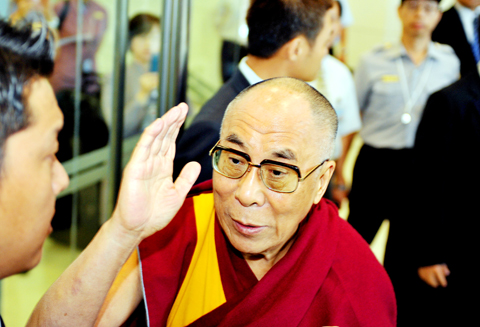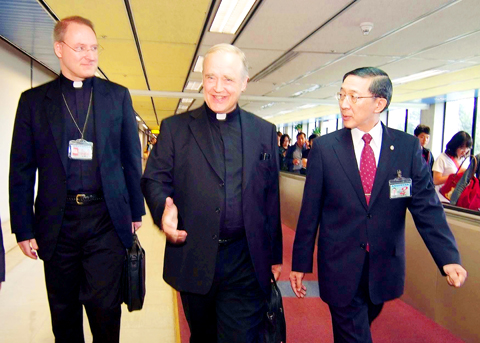The Dalai Lama left Taiwan yesterday after a five-day religious mission.
Tibet’s exiled spiritual leader left from Taiwan Taoyuan International Airport, seen off by more than 100 supporters and monks shouting “Long live the Dalai Lama.”
The Dalai Lama arrived in Taiwan late on Sunday night for a tour primarily aimed at comforting victims of Typhoon Morakot, which battered southern Taiwan last month, killing at least 614 people.

PHOTO: SAM YEH, AFP
Asked whether he thought he would ever be able to return to his Himalayan homeland, which he left half a century ago at the end of a failed uprising against Chinese rule, he said: “We are always ready to go back to Tibet.”
“Of course, every Tibetan always thinks that way,” he told reporters at the airport as he prepared to depart.
Although he said repeatedly that his visit was “non-political,” China voiced its anger and canceled several delegations to Taiwan, including one led by a central bank deputy governor.

PHOTO: CNA
During his stay, the Dalai Lama also had a dialogue with Taiwan’s Catholic leader, Cardinal Paul Shan (單國璽), and held audiences with Tibetan expatriates and local followers of Tibetan Buddhism.
His visit was marred by sporadic demonstrations by pro-unification activists.
Observers said that short-term cross-strait tension was inevitable, but that it would not have a longer-term effect because both Taiwan and China had too much to lose.
“The Dalai Lama’s trip will cause the relationship to cool on the surface, with Beijing cutting down on some activities,” said Hsu Yung-ming (徐永明), a political analyst at Taipei’s Soochow University.
“However, in the long term, the development in ties across the Taiwan Strait will not be affected because it would be bad for both sides,” Hsu said.
The Chinese-language Apple Daily said excessive criticism of the Dalai Lama could backfire on China.
“The more China uses all its resources to suppress a smiling monk, the more international sympathy and welcome he will receive,” it said in an editorial.
After his departure, the Chinese Nationalist Party (KMT) yesterday expressed the hope that exchanges with China would soon get back on track.
The director of the KMT’s mainland affairs department, Chang Jung-kung (張榮恭), said yesterday it would invite high-level officials from China to visit Taiwan next month, with the possibility they would meet with President Ma Ying-jeou (馬英九). Ma will take over the KMT chairmanship on Oct. 17.
The KMT was negotiating with China regarding the group meeting with Ma, he said.
Chang said the Dalai Lama’s visit had had a negative impact on Taiwan-China relations, and said the KMT expected cross-strait relations to return to normal after the Tibetan spiritual leader left.
“We expect the two sides to continue showing sincerity based on the [so-called] ‘1992 consensus’ and goodwill toward each other, and that cross-strait exchanges will return to normal,” he said.
Chang said he was concerned that negotiations between the Straits Exchange Foundation and China’s Association for Relations Across the Taiwan Strait would be affected by the Dalai Lama’s visit.
The Democratic Progressive Party (DPP) said yesterday the Dalai Lama’s visit had been a successful humanitarian mission, but lamented the government’s unfriendly treatment of a respected religious leader.
“The Dalai Lama did exactly what he came to do, which was to pray and bless the victims of Typhoon Morakot. It was immoral of the pan-blue camp to politicize the trip and smear Kaohsiung Mayor Chen Chu’s (陳菊) name,” DPP spokesman Cheng Wen-tsang (鄭文燦) said.
Cheng was one of seven local government chiefs who invited the Nobel laureate to visit.
Cheng also panned the government for its inhospitable reception of the Dalai Lama, such as downgrading his security detail and Ma’s refusal to meet with him, saying such gestures had left the public feeling “uncomfortable.”
In related news, an envoy of Pope Benedict XVI arrived yesterday for a nine-day visit to attend an international humanitarian assistance conference in Taipei and to provide comfort to Morakot survivors.
A Ministry of Foreign Affairs press release said Cardinal Paul Cordes, president of the Holy See’s Pontifical Council Cor Unum, will preside over the Spiritual Exercise for the Leaders of the Church’s Charitable Organization in Asia 2009, which opens on Monday at Fu Jen Catholic University.
Cordes will also visit Kaohsiung and Pingtung counties to convey the pope’s concern for Morakot’s victims, the press release said.
“At a time when reconstruction is being carried out after part of our country was devastated by Morakot, the cardinal’s visit and the holding of the conference will bring great comfort and consolation to our people,” the release said.
ADDITIONAL REPORTING BY JENNY W. HSU

CHAOS: Iranians took to the streets playing celebratory music after reports of Khamenei’s death on Saturday, while mourners also gathered in Tehran yesterday Iranian Supreme Leader Ayatollah Ali Khamenei was killed in a major attack on Iran launched by Israel and the US, throwing the future of the Islamic republic into doubt and raising the risk of regional instability. Iranian state television and the state-run IRNA news agency announced the 86-year-old’s death early yesterday. US President Donald Trump said it gave Iranians their “greatest chance” to “take back” their country. The announcements came after a joint US and Israeli aerial bombardment that targeted Iranian military and governmental sites. Trump said the “heavy and pinpoint bombing” would continue through the week or as long

TRUST: The KMT said it respected the US’ timing and considerations, and hoped it would continue to honor its commitments to helping Taiwan bolster its defenses and deterrence US President Donald Trump is delaying a multibillion-dollar arms sale to Taiwan to ensure his visit to Beijing is successful, a New York Times report said. The weapons sales package has stalled in the US Department of State, the report said, citing US officials it did not identify. The White House has told agencies not to push forward ahead of Trump’s meeting with Chinese President Xi Jinping (習近平), it said. The two last month held a phone call to discuss trade and geopolitical flashpoints ahead of the summit. Xi raised the Taiwan issue and urged the US to handle arms sales to

State-run CPC Corp, Taiwan (CPC, 台灣中油) yesterday said that it had confirmed on Saturday night with its liquefied natural gas (LNG) and crude oil suppliers that shipments are proceeding as scheduled and that domestic supplies remain unaffected. The CPC yesterday announced the gasoline and diesel prices will rise by NT$0.2 and NT$0.4 per liter, respectively, starting Monday, citing Middle East tensions and blizzards in the eastern United States. CPC also iterated it has been reducing the proportion of crude oil imports from the Middle East and diversifying its supply sources in the past few years in response to geopolitical risks, expanding

An Emirates flight from Dubai arrived at Taiwan Taoyuan International Airport yesterday afternoon, the first service of the airline since the US and Israel launched strikes against Iran on Saturday. Flight EK366 took off from the United Arab Emirates (UAE) at 3:51am yesterday and landed at 4:02pm before taxiing to the airport’s D6 gate at Terminal 2 at 4:08pm, data from the airport and FlightAware, a global flight tracking site, showed. Of the 501 passengers on the flight, 275 were Taiwanese, including 96 group tour travelers, the data showed. Tourism Administration Deputy Director-General Huang He-ting (黃荷婷) greeted Taiwanese passengers at the airport and